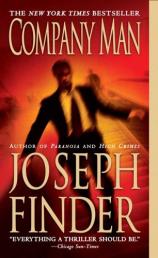Interview: April 22, 2005
April 22, 2005
Bookreporter.com's Suspense/Thriller Author Spotlight Team (Carol Fitzgerald, Joe Hartlaub and Wiley Saichek) interviewed Joseph Finder, author of COMPANY MAN. Finder talks about his inspiration for his latest thriller, why he especially enjoyed writing the character of Detective Audrey Rhimes --- his female protagonist --- and the similarities and differences between this novel and his previous bestseller, PARANOIA.
Bookreporter.com: What was your inspiration for COMPANY MAN?
Joseph Finder: After I wrote PARANOIA, about a young slacker who hates his job and is promoted way up the ladder in his new company, I decided I wanted to write about life from the other side --- from the top. I wanted my hero to be a CEO. You never see a CEO as a hero --- the CEO is always the bad guy. I thought it was time for popular fiction to have a CEO-protagonist. Once I made that decision, a lot of other things fell into place. What wrenching personal drama might be faced? What crisis at work? That's how I settled upon the storyline in which a guy who's the head of a corporation goes from being the most beloved man in town to the most hated, after laying off half his workforce. My novels always focus on the personal drama a character goes through --- that's what makes it interesting to me and, I hope, to the reader.
BRC: Readers will wonder if Nick Conover is based on anyone in particular. What's your reply to that?
JF: I was pretty careful not to model him on any of the many CEOs I interviewed for this book. I was able to talk to a lot of CEOs, at companies ranging from Steelcase to Kellogg's to a number of other corporations that don't want me naming names. But I took bits and pieces of the people I met, and then created a character who came from a blue-collar background, was a regular guy --- not a genius --- but a very likeable person.
BRC: COMPANY MAN is a novel loaded with situations that pose moral dilemmas and value issues, which contribute to rather than distract from the suspenseful elements. Did you set out to write the book knowing that these moral dilemmas were going to be posed, or did they evolve as you started writing?
JF: Yes, I started out knowing that my characters were going to face some tough moral choices. I wanted my CEO hero to deal with the same problems real-life CEOs sometimes have to face. Same with my police detective hero. I don't want to reveal too much here, obviously, but these kinds of tough choices are what give us a glimpse into the characters' inner lives.
BRC: Detective Audrey Rhimes is one of the most memorable characters in COMPANY MAN. Rhimes is a person of unabashed deep and abiding faith, who lives her beliefs every day, and every moment, of her life. She has qualities that are rare in most characters found in mainstream fiction. She is a catalyst for many of the positive things that occur in COMPANY MAN. What, or perhaps more accurately, who, was your inspiration for Audrey Rhimes? And will we perhaps see more of her in the future?
JF: I loved writing Audrey. I'd never written a character before who had a strong religious faith, and I realized that you rarely encounter such characters in fiction. In most popular fiction, a character with a strong religious affiliation is more likely to be a serial killer than a hero. Actually, she was inspired by two homicide detectives I interviewed for COMPANY MAN. One was a black woman on the Boston police force; the other was a retired homicide investigator who was with the Grand Rapids police. Both were strongly religious. I think a belief in God is what motivates a lot of homicide detectives to do their difficult work. My retired Grand Rapids cop source had a sign on his desk that said, "Remember: We work for God." I borrowed that for Audrey. I don't know if she'll appear in another book, but I hope so.
BRC: In an interview with Tom Perrotta, the author of LITTLE CHILDREN, on your website, you talk about the differences between COMPANY MAN and your last book, PARANOIA, and how the books are both similar and different. Can you share those insights with our readers?
JF: Unlike some writers who turn out the same book year after year, with only slight variations, I never write the same book twice. I'd find it too boring, and I think I owe my readers a new book each year, not a retread of last year's model. PARANOIA was told in the voice of a 26-year-old guy, very sardonic and wise-ass and ironic. COMPANY MAN is told in the third-person because there are two protagonists, not one --- a CEO and a homicide investigator --- and we root for both of them even though they're working against each other. Nick Conover, in COMPANY MAN, is older than Adam Cassidy in PARANOIA. Nick's a family man. Audrey's a childless woman in a failing marriage. But both novels have a lot of similarities too --- the same backstabbing at the workplace, the same scary intrigue, the same ironic humor. And both of them are about people and their relationship to their jobs. I think both books have a lot of funny stuff in them, and some scary scenes, and I think --- I hope --- that both are fast-moving and exciting.
BRC: One underlying plot in the book has to do with the remodeling of the kitchen in Conover's house to his deceased wife's exact specifications. In one scene in particular we see the "inner emotion" of Conover when he lays out in specific terms how the renovation must be completed. Did you intentionally create this remodel as a plot device to see "inside" Conover?
JF: Yes --- I wanted us to see Nick's devotion to his late wife, and how far it went. Here's a guy who doesn't care about how he dresses or what he spends money on, but since his wife was so concerned about renovating the kitchen of their big new house, he has to care too, in order to honor her memory. We see how torn he is --- ordinarily he'd never think about what kind of granite counter to use in the kitchen or what kind of appliances, but he wants every detail done just the way his late wife wanted. In other words, my intention was for us to see Nick grieving for his wife, but in a non-sentimental way.
BRC: You make strong and effective use of metaphors in COMPANY MAN, especially at its climax. Are there any authors who utilize metaphoric styles who have influenced you?
JF: Sure, but it's mostly the literary writers, ranging from Jonathan Franzen (THE CORRECTIONS) to Sue Miller (THE GOOD MOTHER) to Philip Roth to Saul Bellow. I'm writing popular fiction --- entertainment --- not Literature. But I think we thriller writers should feel free to borrow the best techniques used by our more literarily serious comrades. After all, we're all just trying to tell a story --- just in different ways.
BRC: Your last book PARANOIA was a huge success. Did that add any pressure to you as you sat down to write COMPANY MAN?
JF: Yeah, somewhat. Way more readers discovered me through PARANOIA, and I was aware that they'd expect a story every bit as good as that. I knew my publisher wanted something as appealing as PARANOIA too. But when I finally sat down to write the book, I just wrote it with blinders on, trying to do the best story I could.
BRC: In PARANOIA there was a lot of talk about the ending and "what happened." What are you hearing most from early readers of COMPANY MAN?
JF: Just about all of the early readers of COMPANY MAN loved the ending. There's a big twist at the end of the book that catches almost every reader by surprise. But most readers, I think, find the very last scene of COMPANY MAN more satisfying than the very last scene of PARANOIA, which was pretty controversial. I liked them both.
BRC: What are you working on now, and when can readers expect to see it?
JF: I can't say very much at this point. But it's another thriller set in a high-tech company, like PARANOIA, a very cool company. It's probably going to be set in Boston --- the first time I'll have an entire novel set in the city in which I live. The protagonist is younger than Nick Conover but older than Adam. And so far I'm liking it a lot.




